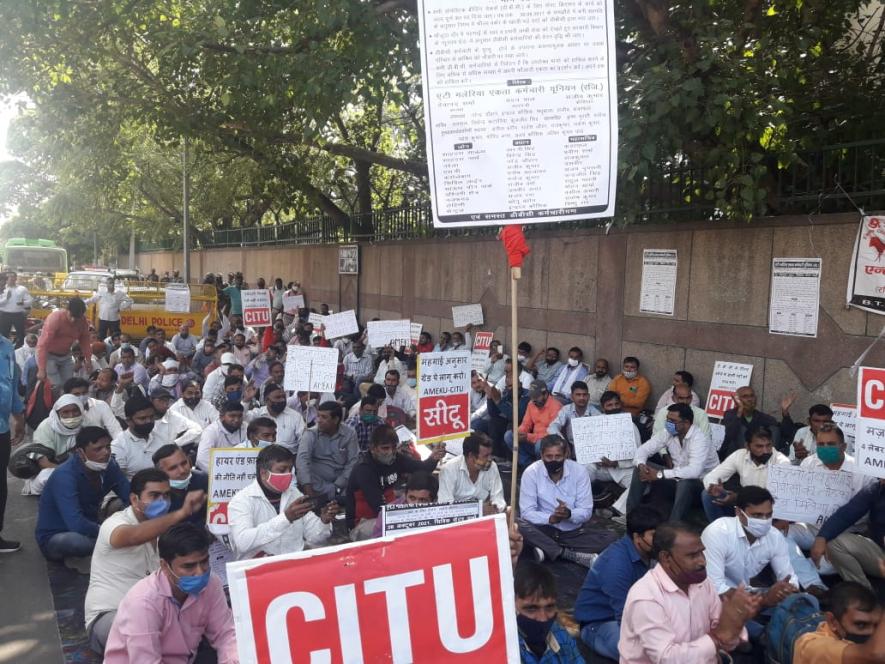Delhi: Mosquito Breeding Checkers Threaten Strike Over Non-Regularisation of Posts

A demonstration was staged on Tuesday outside the Civic Centre in Delhi.
New Delhi: Amid vector-borne diseases ravaging the national capital, hundreds of employees of Delhi’s three municipal corporations deployed to check breeding of mosquitoes staged a demonstration here on Tuesday. They demanded immediate regularisation of their post – something that was assured to the protesting unions in writing, following an indefinite strike in 2017.
There are as many as 3,500 DBCs or Domestic Breeding Checkers in the national capital, who are employed on a contractual basis by the three municipal corporations – North, South and East. On Tuesday, a section among them, led by the Centre of Indian Trade Unions (CITU)-backed Anti-Malaria Ekta Karamchari Union (AMEKU) protested outside the Civic Centre.
The DBCs threatened to go on strike again from November 25 if their demands are not addressed by the administrations of the three municipal corporations, currently being ruled by the Bharatiya Janata Party (BJP).
“It’s been more than 26 years since the union has been demanding the posts of the anti-malaria workers to be created within the department. In 2017, we even received a written assurance by the corporations, but our demands have not been met till now,” Madan Pal, general secretary, AMEKU, told NewsClick on Tuesday.
Pal said an anti-malaria worker is paid low wages without any additional benefits. “There is no Employee State Insurance (ESI), Provident Fund (PF) scheme available for us; nor are there any paid leaves. Even today, the employees who took an off to participate in the protest will face a cut in salaries,” he said.
Pal said the union had submitted a memorandum to the corporation officials, enlisting their demands. “If they are not met immediately, then we will go on strike on November 25,” he said.
The Delhi-unit of CITU has given a city-wide call for a strike in the national capital on November 25 to register protest against the “anti-worker policies” of the Aam Aadmi Party (AAP)-led Delhi government and the Central government.
The strike of DBC workers, if observed, may add to the health crisis in the national capital as post-monsoon vector-borne diseases, such as dengue, are on the rise. According to the civic report on Monday, over 283 cases of dengue have been reported in the national capital in the past week, taking the season’s total to cross the 1,000-mark. These numbers are the highest since 2018.
Anurag Saxena, general secretary, CITU-Delhi NCR, who was present in Tuesday’s demonstration, told NewsClick that the responsibility of not regularising the posts of the anti-malaria workers in municipal departments falls on both the BJP and AAP.
“Both the parties must sit together and find a solution to this as soon as possible. Till then, the anti-malaria employees can at least be paid as per the Group D wage rates – this is going by the principle that equal pay must be given to those doing equal work,” he said.
Saxena said the DBCs are currently receiving monthly salaries on par with the minimum wage rates for the semi-skilled worker in Delhi, which comes about to around Rs. 17,500.
Meanwhile, with the MCD polls scheduled for next year, rising vector-borne diseases have also triggered an exchange of allegations between the AAP and BJP. The former, which is trying to come to power in the civic bodies, is up against the latter, which is ruling all three MCDs since the past 15 years.
On Tuesday, the AAP alleged that criminal negligence of the BJP-ruled MCDs was responsible for the status quo in the capital. “More than 70% posts are vacant in the anti-malaria department of the corporations due to misgovernance and corruption by BJP,” The Hindu quoted AAP MLA Atishi as saying.
Get the latest reports & analysis with people's perspective on Protests, movements & deep analytical videos, discussions of the current affairs in your Telegram app. Subscribe to NewsClick's Telegram channel & get Real-Time updates on stories, as they get published on our website.























